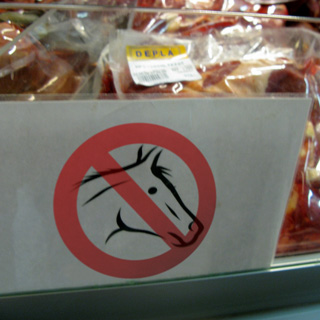Unless you’ve been living in a cave the past few months you will most likely have heard about the horse meat scandal (technically known as the ‘meat adulteration scandal’) and have been following the story as it has progressed. While the details are rather complicated, the bottom line is that the meat we’ve been eating in good faith hasn’t always been quite what it seemed and often cheaper meat advertised as ‘beef’ has in fact contained a fair amount of horse.
The question though, is whether you are at risk now. Is it safe to eat this meat? And if not, what can you do to protect yourself? Here we will look at what’s going on in a bit more detail and at the health implications of this mess.
History
 The presence of horse meat in our food was first discovered on the 30th November 2012 when the Food Safety Authority of Ireland (FSAI) discovered horse DNA in 10 out of 27 hamburgers (with 23 of them also testing positive for pig DNA). More samples from various supermarket chains were then tested with many testing positive for the presence of equine and porcine DNA. On the 4th February, Findus (a British food manufacture supplying Tesco) withdrew one of their frozen lasagne ranges in response to concerns from Comigel (one of their suppliers) that the meat used did ‘not conform to specifications’. Comigel also supplies meat to many other companies across 16 countries around the world.
The presence of horse meat in our food was first discovered on the 30th November 2012 when the Food Safety Authority of Ireland (FSAI) discovered horse DNA in 10 out of 27 hamburgers (with 23 of them also testing positive for pig DNA). More samples from various supermarket chains were then tested with many testing positive for the presence of equine and porcine DNA. On the 4th February, Findus (a British food manufacture supplying Tesco) withdrew one of their frozen lasagne ranges in response to concerns from Comigel (one of their suppliers) that the meat used did ‘not conform to specifications’. Comigel also supplies meat to many other companies across 16 countries around the world.
On the 14th of February 2013 the French Government accused Spanghero as being responsible for the fraud having shipped 750 tons of meat during the period – though the company defended themselves by stating that they acted in good faith and that one of their suppliers was to blame. That same day a 63 year old man was arrested at Peter Boddy Licensed Slaughterhouse in Todmorden, England, and two other men were held at Farmbox Meats Ltd in Wales.
Further studies have continued to test meat across the world and have made more alarming discovers. In South Africa traces of water buffalo, goat and donkey have been found in various products, while a Polish meat processing plant was caught washing mould off of old meat and repackaging it as sausage and ham and three more Polish plants were caught labelling horse meat as beef.
Is it Safe?
The big question is whether this meat poses any health risks. Fortunately horse meat in itself is not dangerous and won’t cause any harm. The problem however lies with a vetinary drug given to horses known as ‘bute’. This substance can trigger a serious reaction known as ‘aplastic anaemia’ in around 0.003% of people. Other traces of drugs may also exist in horse meat too including phenylbutazone. Phenylbutazone is particularly commonly used in the US and may have entered the food chain via Mexico before being exported to Europe. Some experts are also concerned that horse meat from Romania could be contaminated with equine infectious anaemia which does not affect humans but could indicate a number of other health conditions.
More to the point, this also raises questions regarding what else may have gotten into our food chain and shows us just how little we really know about the food we eat in good faith. For religious groups that ban the consumption of horse and pork this is also particularly concerning and raises many ethical issues.
How to Protect Yourself
So how can you protect yourself and what can you do to remain safe? Well the main lesson to take home, is that you should be discerning with the meet you choose to eat. While you can never be entirely certain that meals you eat will contain only the ingredients they list, it is generally the cheaper ready meals that have been found to be breaking the law. If you’re partial to eating microwavable meals, then this is just one more reason to start cooking for yourself instead (the other reasons being the high amount of salt, fat and sugar). If you buy steak or mince where you can actually see the raw meat then you will be at very little risk and if you must buy ready meals then you should just be willing to spend a little more on them. Want to eat cheaply and be guaranteed to get fresh, high quality meat? Then swing by your local butcher’s at the end of the day and ask them if they have any leftovers they can spare you – usually they’ll be more than happy to part with these cuts cheaply.



